Power of Labor
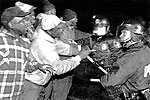
Charleston Five longshoremen arrested for defending picket lines
against cop attack (January 2000).
click on photo for article
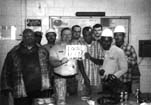
South Carolina clay miners appeal for solidarity in fight for
their union (October 2001).
click on photo for article
December 2002
| IG at Bay Area Labor
Conference:
Strike Against Taft-Hartley!
Internationalist Group supporters intervened with a program for sharp class struggle at a “National Labor Conference Against Taft-Hartley and Union-Busting” held December 7 in San Francisco. The event was called in response to President Bush’s use of the slave-labor law to order 10,500 members of the International Longshore and Warehouse Union back to work in October, after they had been locked out by the employers’ Pacific Maritime Association. The conference was held immediately before the week-long Coast Caucus of the ILWU, which on December 12 voted in favor of the contract proposal promoted by the ILWU leadership and the PMA – and openly pushed by the Bush government. This contract would mean the loss of 400-600 jobs in the short term as well as undercutting the union hiring hall won in the historic 1934 SF maritime strike. (The contract will now be sent to the union membership for approval or rejection.) Called under the auspices of the ILWU, the AFL-CIO labor councils of the Bay Area, several local unions and various “solidarity” groups, the December 7 conference was attended by some 200 unionists. Many came hoping for a real strategy for labor action against Taft-Hartley and the U.S. rulers’ drive for war on Iraq. Representatives of the Liverpool dockers brought news of the British fire fighters’ strike and denounced “Labor” Party prime minister Tony Blair’s strikebreaking and plans to send troops to Iraq. Myron Renew, union organizer of the Kentucky-Tennessee Clay miners in Langley, South Carolina, addressed the conference on the fight to unionize the South in the aftermath of the successful defense of the Charleston Five longshoremen. A spokesman for the Tate Lyle workers in the Decatur, Illinois “war zone” eloquently warned against illusions in the “labor hacks” of the AFL-CIO leadership who stabbed their struggle in the back. Yet overall the conference was a talk shop for union bureaucrats who wanted to blow off steam but opposed any real mobilization of the power of labor against Taft-Hartley and imperialist war. This was made clear in the opening session when ILWU press spokesman Steve Stallone said that while the PMA told the public the lockout was the union’s fault, “the ILWU made news and scored a lot of PR points by continuing to do a certain amount of the work,” including shipping “critical cargo” to Alaska and Hawaii and “continu[ing] to work the military cargo so that the government couldn’t get on our case about that.” In fact, workers picketed the docks during the lockout, and a union leadership worth its salt would have seen to it that nothing moved and that the docks were shut down tight. In the perfunctory plenary discussion at the end of the conference, an Internationalist Group speaker (the only person to speak from the audience in opposition to the bureaucrats), said that “a love-in where everyone says a lot of hot air about solidarity” would accomplish nothing. What’s needed, he said, is to organize class-struggle action like “ripping up this contract promoted by Bush and the Pentagon, striking against Taft-Hartley, backed by a mobilization of all labor, and hot-cargoing war goods instead of boasting about loading them like Steve Stallone did in the opening session” – whereupon this spokesman for the ILWU International burst into enraged heckling. (Earlier, Stallone stormed off the stage when the Tate Lyle worker criticized the sellout ILWU contract proposal.) Our speaker was met with loud applause from part of the audience, booing from others, and an “answer” from ILWU Local 10 Secretary-Treasurer Clarence Thomas, who said hot-cargoing war goods is not possible because “we live in the real world.” At an earlier workshop on “Labor and the War,” Thomas spoke at length against the IG’s call, saying “the reality of the situation is that we have to do it,” i.e., load war materiel. This is the same kind of logic as the ILWU International’s bowing down to Taft-Hartley with only pro forma verbal protest. Thomas was echoed by a spokeswoman for the International Socialist Organization, who after lauding Thomas for speaking “passionately and eloquently” said, “I don’t think it’s a question right now of stopping the military cargo.” At another workshop, the ISO responded to an IG comrade’s call for strike action and hot-cargoing by saying, “You have to learn to walk before you can run.” While presenting this patronizing view of the organized working class as toddlers, social democrats like the ISO sure know how to crawl before the bourgeoisie. We print below the intervention by an IG comrade at the “Labor and the War” workshop, followed by the Internationalist leaflet distributed at the conference and the subsequent ILWU Coast Caucus: My name is Abram, from the Internationalist Group. The war against the working class and minorities is part of this imperialist war which the American ruling class is unleashing against Iraq. Our organization raises the call for the defeat of U.S. imperialism and the defense of Iraq. |
Strike to Smash Taft-Hartley Anti-Labor War Repression!
For Powerful Workers Action
Against the Bosses’ War!
The following is an Internationalist Group leaflet distributed at the labor conference against Taft-Hartley and union busting held in San Francisco on December 7.
The U.S. imperialist war on Iraq is also a capitalist war on the working class, blacks, Latinos and immigrants in the United States. While the Pentagon prepares to nuke civilian bomb shelters in Baghdad, American employers and their government are going after the unions, oppressed minorities and democratic rights with a vengeance. This is class war, and as the Harlan County miners declared in the bloody coalfield wars of the 1930s, there are no neutrals here.
But it’s “one-sided class war,” and it’s been that way for a long time. The warmongers won’t be stopped by UN debates, jawboning in Congress, peace parades around the White House, or two, three, many antiwar resolutions by labor bureaucrats. The bosses’ war must be defeated – in Iraq and on the home front – by mobilizing the power of the working class, in the streets, on the docks and in the plants.
A National Labor Conference Against Taft-Hartley and Union-Busting has been called in San Francisco for December 7, by International Longshore and Warehouse Union Local 10, the ILWU International, San Francisco, Alameda and South Bay Labor Councils, and various Bay Area unions. Fighting the “slave labor law” used against West Coast longshore workers locked out by the Pacific Maritime Association bosses last September should be the cause of all labor. But how exactly should Taft-Hartley be fought? Here there is a sharp counterposition between those who pine for the “good old days” of class collaboration and those who stand for uncompromising class struggle.
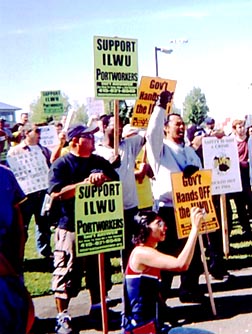 ILWU dock workers and supporters at
October 5 solidarity rally. The organized workers movement should have mobilized
its power to defy the Taft-Hartley “slave labor law.”
(Internationalist photo)
ILWU dock workers and supporters at
October 5 solidarity rally. The organized workers movement should have mobilized
its power to defy the Taft-Hartley “slave labor law.”
(Internationalist photo)
At the October 5 labor solidarity rally in Oakland, “progressive” Bay Area labor leaders like SF labor council head Walter Johnson vowed to shut down San Francisco for a few hours if Taft-Hartley was used against longshore workers. Another top union official said labor should close the Golden Gate and Bay Bridges. Demonstrators chanted, “Shut it down! Shut it down!” Back in August, the SF Labor Council issued a resolution against a war on Iraq and demanding the government stay off the docks. But this was just hot air. Taft-Hartley was imposed and nothing happened, not even symbolic actions. In many ways it was a replay of how the AFL-CIO tops bowed to Reagan’s busting of the PATCO air controllers strike in 1981, paving the way for wholesale union-busting around the country. The stakes today are no less.
The program of class struggle requires a class-struggle leadership to wield it, and that leadership must be forged in combat against the pro-capitalist bureaucracy. The present misleaders of labor, including the sponsors of this conference, have chained the workers and oppressed to the class enemy, in the form of the Democratic Party. Republican George Bush slapped a Taft-Hartley injunction on the ILWU, but Democrat Diane Feinstein demanded he do so. And the ILWU and Bay Area labor council tops all backed Feinstein for senator, even if some did so claiming she was a “lesser evil.” Lesser-evilism is a program for defeat.
The characteristic Bay Area “popular front” stretches from Feinstein through the union bureaucracy to various left-wing groups. Feinstein (who flew the Confederate flag at SF city hall when she was mayor) was a little hard for many leftists to swallow, so instead they championed black Democrat Barbara Lee. The Workers World Party (WWP), Communist Party (CP) and even the erstwhile Trotskyists of the Spartacist League (SL) all hailed Lee for refusing to vote for Bush’s war powers resolution last year. For weeks on end, they all kept silent about the fact that Lee voted for the $40 billion war budget. (This past fall, Lee said talk of Taft-Hartley was “premature” – that is, Bush used it too early.)
The Iraq war cannot be separated from the assault against longshore workers, although many desperately try to do so. During the PMA lockout, none of the ISO/WWP/CP reformists, not even the left-centrists of the SL, called on the ILWU to “hot cargo” war materiel, as the Internationalist Group did. Everyone at the conference will declare their opposition to Taft-Hartley union-busting; many will recall how in 1978 the coal miners ripped up Jimmy Carter’s Taft-Hartley injunctions. But the reformists and centrists did not call for dock workers to defy Taft-Hartley and refuse to work under slave labor conditions. No doubt there will be a lot of criticism at the conference of the sellout contract negotiated by the ILWU leadership under Jim Spinosa, which the Coast Caucus is set to vote on Monday, December 9. But the opportunists have avoided the “s-word” (strike) like the plague. We say today, as The Internationalist has said since last summer, that it is necessary to organize a coastwise strike to defeat the union-busting offensive.
 So what about the ILWU contract? Bush says it’s a good deal,
PMA boss Miniace praises it, Spinosa hails it, but many longshore and warehouse
workers aren’t buying it. The terms are still being kept secret from the
membership, but any class-conscious union militant knows that a “settlement”
announced by the White House is bad news for the workers. From the information
that has leaked out so far, it’s clear that the ILWU leaders sacrificed thousands
of future union jobs in the name of “modernization.” This recalls the “modernization
and mechanization” (M&M) contracts negotiated by ILWU founder Harry Bridges
in the 1960s which drastically cut the union ranks. The union hiring hall,
a key gain of the 1934 strike, is threatened by the growth of “steady men”
jobs. And a sweetheart deal has reportedly been negotiated for higher wages
in Spinosa’s home port of Los Angeles-San Pedro. ILWU workers should vote
the sellout down and shut down the coast tighter than a drum.
So what about the ILWU contract? Bush says it’s a good deal,
PMA boss Miniace praises it, Spinosa hails it, but many longshore and warehouse
workers aren’t buying it. The terms are still being kept secret from the
membership, but any class-conscious union militant knows that a “settlement”
announced by the White House is bad news for the workers. From the information
that has leaked out so far, it’s clear that the ILWU leaders sacrificed thousands
of future union jobs in the name of “modernization.” This recalls the “modernization
and mechanization” (M&M) contracts negotiated by ILWU founder Harry Bridges
in the 1960s which drastically cut the union ranks. The union hiring hall,
a key gain of the 1934 strike, is threatened by the growth of “steady men”
jobs. And a sweetheart deal has reportedly been negotiated for higher wages
in Spinosa’s home port of Los Angeles-San Pedro. ILWU workers should vote
the sellout down and shut down the coast tighter than a drum.
Many “progressives” argue the war is a “union issue.” ILWU Local 10 had speakers at both the Washington and San Francisco antiwar protests on October 26. But the war is more than another “issue,” and labor is more than another “constituency” to be appealed to. The workers movement has the power to cripple Washington’s drive for war on Iraq, and U.S. rulers are acutely aware of this. The Bush Administration demanded the injunction against the West Coast port shutdown saying that a work stoppage “may degrade military readiness” and hinder the U.S.’ “ability to prosecute the Global War on Terrorism.” War secretary Rumsfeld argued that a port stoppage “disrupts the flow of essential military cargo…during this time of war.” A solid West Coast dock strike would be a powerful blow against warmongers who are hell-bent on staging a new “Desert Slaughter” in the Persian Gulf.
This is the kind of sharp class struggle against imperialist war that Lenin and Trotsky stood for. Following the 1919 Seattle general strike, dock workers there and in San Francisco refused to load shipments of guns being sent to the White (counterrevolutionary) armies besieging Red Russia. In 1920, British dock workers refused to load war materiel bound for the imperialist siege of the Soviet republic. Today, supporters of the League for the Fourth International in Europe have appealed to dockers in the Netherlands and Belgium to refuse to handle war cargo or to load and unload U.S. Military Sealift Command ships. The policy of the ILWU leadership is the opposite: during the lockout they got the PMA to let longshoremen load war materiel; a Local 10 press release declared, “The ILWU is committed to shipping all military cargo.” Left groups that dodge the question of war cargo (the ISO even pretended the stoppage this fall didn’t affect military shipments) are bowing to the pro-capitalist union bureaucracy and the Pentagon.
Yet there is no ducking the Iraq war in this battle: the government already had talks with the PMA about putting docks under military control in a strike, and there will be sure to be attempts to organize star-spangled scabbing. Jingoistic flag-waving is bowing to the enemy and will only weaken dock workers’ resolve in this hard class battle against wartime anti-labor repression, while “fair trade” protectionism sets U.S. workers against their class brothers and sisters around the world. Each year the ILWU commemorates the workers killed in the 1934 San Francisco port strike. But this is not just ancient history. A dock strike under present wartime conditions would be a bitter battle on the order of the ’34 Frisco strike. Such a showdown requires serious preparations by a class-conscious union leadership.
Some ILWU members fear that if they don’t agree to a concessionary contract, the government will put longshore under the Railway Labor Act and take away even more union gains. But the recent United Air Lines debacle shows the futility of trying to buy security by piecing off the bosses. The Wall Street Journal wrote that the settlement agreed to by the PMA and the ILWU tops was a victory for government union-busting, headlining “Taft-Hartley, Victorious.” Longshore workers have the power to make this voice for the bankers and speculators eat its words. There is a lot of anger across the country against the corporate criminals who bilked Enron workers of their pensions while shamelessly looting the company. If a fighting union had the determination and program to stand up to the exploiters and war criminals who run this country, it would send shock waves across the U.S.
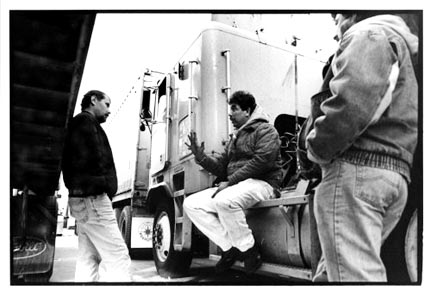
Fight to organize
the unorganized, including non-unionized immigrant truckers (right), and
for full union rights to “B-men” and casuals, is key
to defending union hiring hall and mobilizing against union-busting offensive.
(Photo: David Bacon)
The fight to defend the ILWU must take on anti-union strikebreaking measures like New York’s Taylor Law, now being held as a sword over the head of the Transport Workers Union in NYC. It must be a fight for the rights of blacks and immigrants. Importantly, in 1999 the ILWU stopped work up and down the coast for ten hours to demand freedom for former Black Panther Mumia Abu-Jamal on Pennsylvania’s death row. Many longshore workers are denied full union rights as “B-men” and casuals, while immigrant truckers are the targets of the bureaucrats’ chauvinism. It must be a fight to organize the unorganized, particularly in the racist “open shop” South, as the K-T Clay miners in South Carolina have been courageously waging. Above all, it must be an international fight, and not just with empty solidarity motions. Dock workers unions from around the world represented at the conference have seen their unions ripped apart, despite many gestures of good will and resolutions of solidarity.
What’s needed is class-struggle action. Events in the last few weeks underline the possibility of an international working-class offensive. In South Africa, the recent two-day general strike was the third in three years; in Italy, a million and a half demonstrated against the Iraq war, including many unions, while Fiat workers mobilize in defense of their jobs; in Britain, firefighters strike in defiance of “Bush’s poodle” Tony Blair, who complains that military forces are being diverted from war preparations. In France, public sector workers take to the streets against the government’s privatization plans.
But all of these struggles remain isolated,
nationally and even within each country, because of the traditional workers
leaders who are beholden to “their own” bourgeoisie. This stranglehold will
not be broken by passing a few resolutions, forming one more “coalition”
or launching another campaign. What is required is a real fight for a victorious
class war of the workers and oppressed against imperialist war, union-busting
and racist repression. Only a leadership fighting to build revolutionary
workers parties internationally, in the struggle to reforge Trotsky’s Fourth
International, can lead the working class in the kind of head-on class
struggle so urgently required today. n
Go to PMA Lockout:
A Declaration of War on All Labor! (October 2002)
Go to Strike Now to Defend
ILWU Union Gains! (7 July 2002)
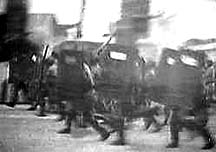
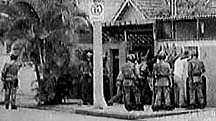
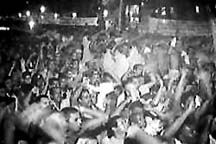 Port workers
in Santos, Brazil fought bitter battle in April 2001 to defend union hiring
hall, a gain which had been won in 1934 (as in the U.S.). Military Police
viciously attacked striking dockers, as in the worst days of the military
regime (1964-1985), leaving 50 injured and 28 arrested. (Photos: TV Mar)
Port workers
in Santos, Brazil fought bitter battle in April 2001 to defend union hiring
hall, a gain which had been won in 1934 (as in the U.S.). Military Police
viciously attacked striking dockers, as in the worst days of the military
regime (1964-1985), leaving 50 injured and 28 arrested. (Photos: TV Mar)